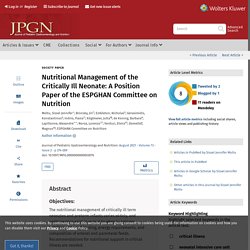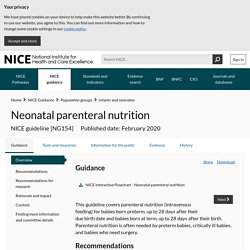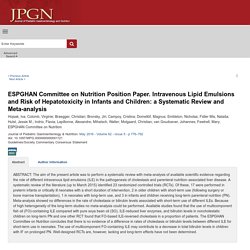

Nutritional Management of the Critically Ill Neonate: A Posi... : Journal of Pediatric Gastroenterology and Nutrition. See “Parenteral Nutrition for Critically Ill Term and Preterm Neonates: A Commentary on the 2021 European Society for Paediatric Gastroenterology, Hepatology and Nutrition Position Paper” by van Goudoever and van den Akker on page 137.

What Is Known/What Is New What Is Known. Neonatal parenteral nutrition. This guideline covers parenteral nutrition (intravenous feeding) for babies born preterm, up to 28 days after their due birth date and babies born at term, up to 28 days after their birth.

Parenteral nutrition is often needed by preterm babies, critically ill babies, and babies who need surgery. Your responsibility. Nutritional support for children during critical illness: European Society of Pediatric and Neonatal Intensive Care (ESPNIC) metabolism, endocrine and nutrition section position statement and clinical recommendations. Guidelines for the Provision and Assessment of Nutrition Support Therapy in the Pediatric Critically Ill Patient: Society of Critical Care Medicine and American Society for Parenteral and Enteral Nutrition. Standards for Nutrition Support Pediatric Hospitalized Patients. Intravenous Lipid Emulsions and Risk of Hepatotoxicity in Infants and Children. What Is Known * There is evidence that intravenous lipid emulsions (ILE) play a role in the pathogenesis of cholestasis and parenteral nutrition–associated liver disease. * A number of trials have suggested that novel fish oil–containing ILE could have a beneficial effect on cholestasis and parenteral nutrition–associated liver disease.

What Is New * The present systematic review identified 23 randomized controlled trials, which evaluated the effect of different ILEs on cholestasis. Optimal nutrition therapy in paediatric critical care in the Asia-Pacific and Middle East: a consensus.